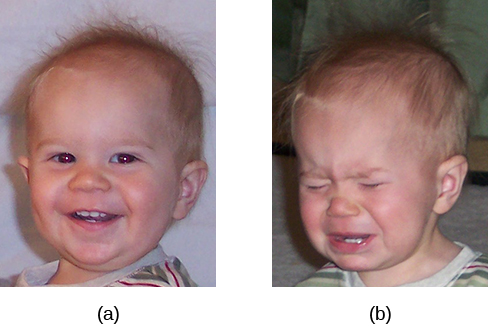| << Chapter < Page | Chapter >> Page > |
As we move through our daily lives, we experience a variety of emotions. An emotion is a subjective state of being that we often describe as our feelings. The words emotion and mood are sometimes used interchangeably, but psychologists use these words to refer to two different things. Typically, the word emotion indicates a subjective, affective state that is relatively intense and that occurs in response to something we experience ( [link] ). Emotions are often thought to be consciously experienced and intentional. Mood , on the other hand, refers to a prolonged, less intense, affective state that does not occur in response to something we experience. Mood states may not be consciously recognized and do not carry the intentionality that is associated with emotion (Beedie, Terry, Lane,&Devonport, 2011). Here we will focus on emotion, and you will learn more about mood in the chapter that covers psychological disorders.

We can be at the heights of joy or in the depths of despair or. We might feel angry when we are betrayed, fear when we are threatened, and surprised when something unexpected happens. This section will outline some of the most well-known theories explaining our emotional experience and provide insight into the biological bases of emotion. This section closes with a discussion of the ubiquitous nature of facial expressions of emotion and our abilities to recognize those expressions in others.
Our emotional states are combinations of physiological arousal, psychological appraisal, and subjective experiences. Together, these are known as the components of emotion . These appraisals are informed by our experiences, backgrounds, and cultures. Therefore, different people may have different emotional experiences even when faced with similar circumstances. Over time, several different theories of emotion, shown in [link] , have been proposed to explain how the various components of emotion interact with one another.
The James-Lange theory of emotion asserts that emotions arise from physiological arousal. Recall what you have learned about the sympathetic nervous system and our fight or flight response when threatened. If you were to encounter some threat in your environment, like a venomous snake in your backyard, your sympathetic nervous system would initiate significant physiological arousal, which would make your heart race and increase your respiration rate. According to the James-Lange theory of emotion, you would only experience a feeling of fear after this physiological arousal had taken place. Furthermore, different arousal patterns would be associated with different feelings.

Notification Switch
Would you like to follow the 'Psychology' conversation and receive update notifications?